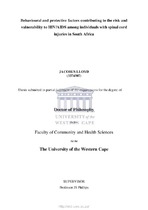Behavioural and protective factors contributing to the risk and vulnerability to HIV/AIDS among individuals with spinal cord injuries in South Africa
Abstract
HIV/AIDS has made a huge impact on human development and sexual reproductive habits in this century in the world and especially in sub-Saharan Africa. It has only recently been acknowledged that HIV/AIDS has an equal if not greater effect on or threat to people with disabilities. Survivors of traumatic spinal cord injury (TSCI) with resultant disability are incorrectly believed to be sexually inactive, unlikely to use drugs or alcohol and at less risk of violence or rape than their non-disabled peers. This group can thus be described as economically, educationally and socially disadvantaged, which in itself, suggest that they are a high-risk group for HIV infection. The overall aim of this study is to examine the factors that could contribute to the risk and vulnerability to HIV/AIDS among individuals with spinal cord injuries in South Africa. The specific objectives of the study are to assess the behavioral and protective factors that could contribute to risk and vulnerability to HIV infection among individuals and spinal cord injuries; and to explore the socio-cultural issues that might increase individuals with spinal cord injuries’ vulnerability to HIV/AIDS. The design of this study was a mixed methods design, particularly the sequential explanatory strategy was used will used in this study. The study was conducted in four (4) conveniently selected provinces (highest prevalence of SCI). The Quad-Para Association of South Africa’s (QASA) provincial databases was used to invite individuals with SCI to participate in the study. Data for quantitative part of the study was collected by means of self-administered questionnaires. The questionnaire consisted of various sections requesting for information on: Demographics; HIV-Knowledge (HIV- KQ-18); Sexual behaviours; Sexual communication and negotiation skills; Self-efficacy to refuse sex. Separate binary logistics analysis was done to assess which of the selected factors are associated with risky sexual behaviour. The forced entry method approach was used to determine which of these factors have the greatest productive power to predict sexual risk behaviour. No “a priori” sample size was developed for the qualitative part, but participants were recruited until saturation has been reached of all the categories. Consenting participants were visited by the researcher for data collection in the environment indicated by the participant. Permission to conduct the study was obtained from the Research Ethics Committee at the University of the Western Cape (UWC). The study was conducted according to ethical practices pertaining to the study of human subjects as specified by the UWC and Faculty of Community and Health Sciences Research Ethics Committee of the UWC.

